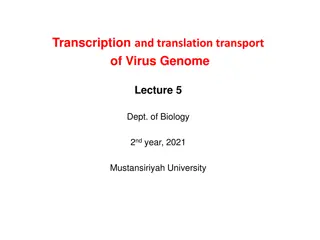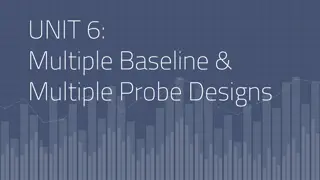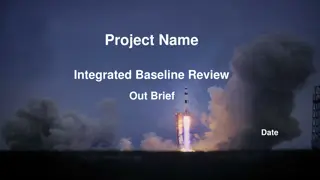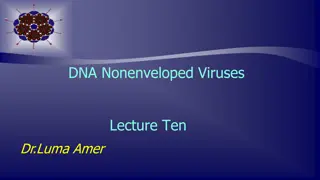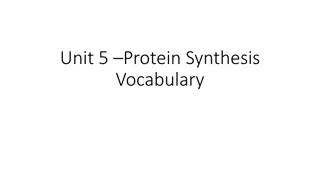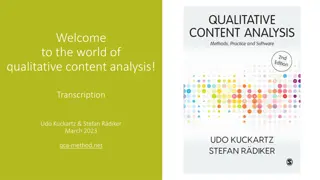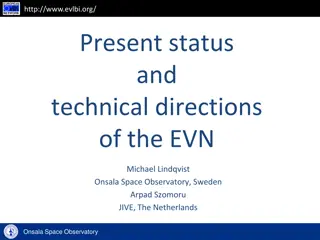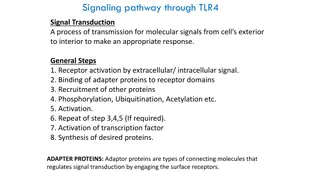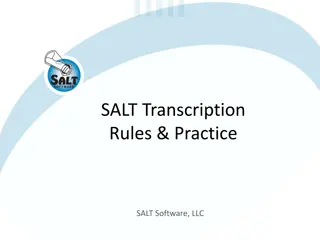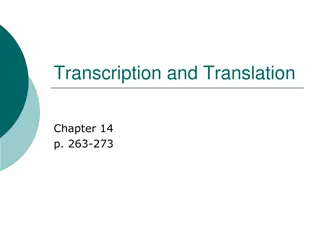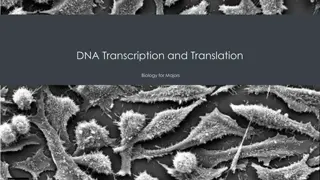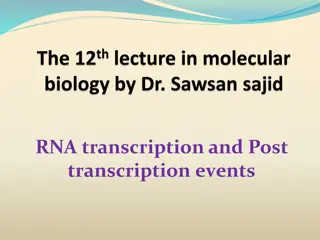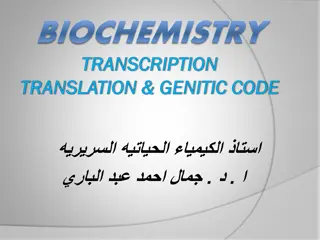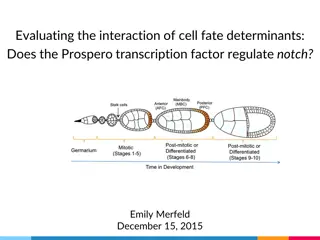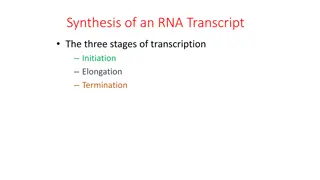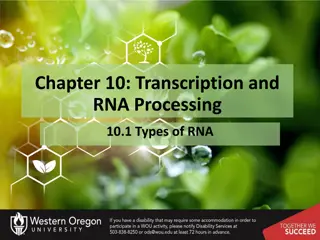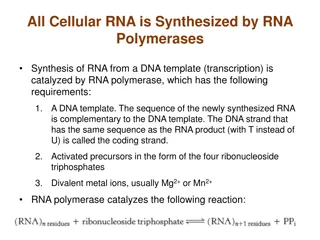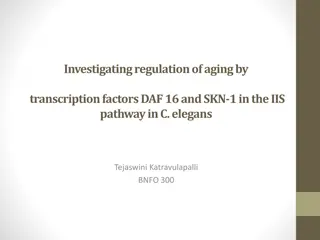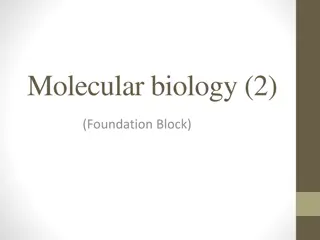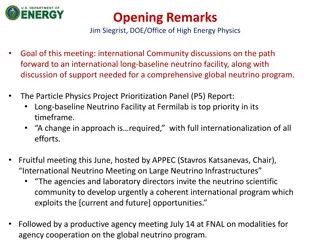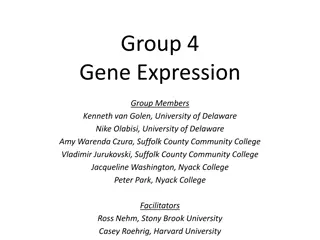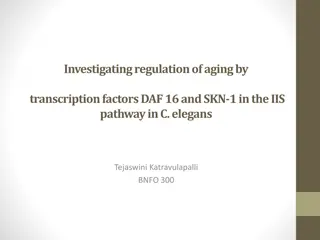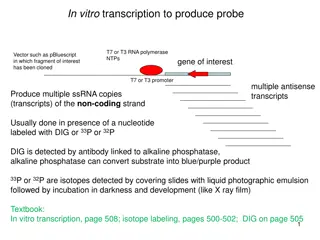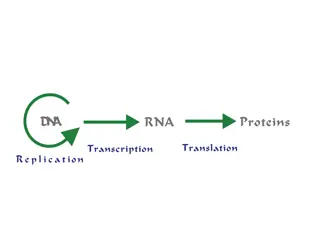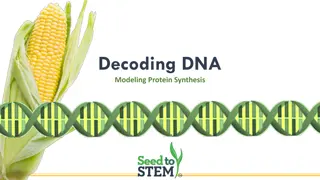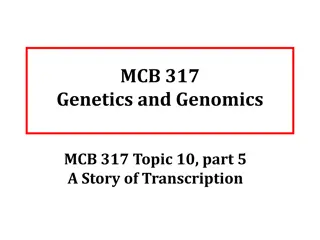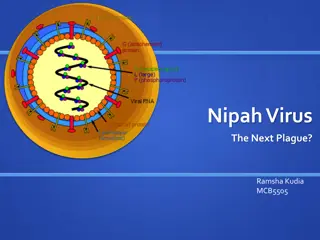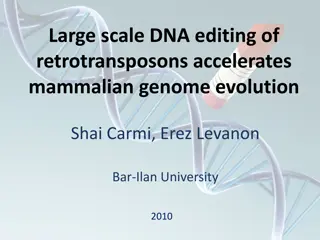Machine Transcription for Call Center Efficiency
Explore the benefits of machine transcription in call centers for improving processes like scripted responses, identifying new questions, and monitoring agent performance. Learn how developing a transcription baseline helps evaluate machine transcription accuracy, enhancing customer experience. Disc
2 views • 14 slides
Understanding Transcription Factors and Regulatory Sequences in Gene Expression
Transcription factors play a crucial role in gene expression by controlling the recruitment of RNA polymerase. Promoter regions contain sequences like CAAT box and TATA box that regulate transcription by binding proteins. Consensus sequences are conserved patterns in the genome with various biologic
2 views • 10 slides
Understanding Transcription and Translation of Virus Genome
The lecture covers the transcription and translation processes of virus genomes, including the Baltimore classification system, transcription control in eukaryotes, and the role of transcription factors in gene expression. It explores how different viruses replicate based on their genome type and me
0 views • 14 slides
Understanding Multiple Baseline Designs in Behavioral Experiments
Multiple Baseline Designs are a type of experimental design used in behavioral research. This design involves measuring two or more behaviors concurrently in a baseline condition, applying a treatment variable to one behavior at a time while maintaining baseline conditions for others, and then seque
0 views • 34 slides
Integrated Baseline Review Out Brief - Key Objectives and Summary
Promoting knowledge and mutual understanding of the Performance Measurement Baseline (PMB), ensuring its realism and adequacy for project success, identifying risks and opportunities, and establishing mitigation plans are key objectives of the Integrated Baseline Review (IBR). The IBR agenda example
0 views • 21 slides
Understanding Adenoviruses: Structure, Replication, and Epidemiology
Adenoviruses, known for causing respiratory infections, have at least 41 serotypes categorized into 6 subgenera. Their structure includes 252 capsomeres, 240 hexons, and specific proteins for attachment. The replication involves virus attachment, penetration, uncoating, and transportation of viral D
0 views • 22 slides
Understanding Protein Synthesis Process in Cells
Explore the key terms related to protein synthesis: RNA, mRNA, rRNA, tRNA, protein synthesis, transcription, translation, amino acid, codon, and anticodon. Understand the intricate process of protein formation through transcription and translation steps.
0 views • 11 slides
Guidelines for Interview Transcription in Qualitative Content Analysis
Guidelines for transcribing interviews in Qualitative Content Analysis (QCA) include formatting rules, speaker attribution, verbatim transcription, punctuation adjustments, marking pauses and emphases, handling vocalizations and fillers, managing disruptions, and capturing non-verbal activities. Var
0 views • 7 slides
Enhancing Communication: The Role of Relay Services for Individuals with Hearing or Speech Disabilities
Explore the importance of telephone communication for individuals with hearing or speech disabilities, and how relay services facilitate communication through text transcription. Learn about the speed of transcription, VCO services, and the basic method of communication that is often taken for grant
0 views • 18 slides
Overview of European Very Long Baseline Interferometry Network (EVN)
The European Very Long Baseline Interferometry Network (EVN) is a collaborative effort among major institutes in Europe to conduct advanced astronomical observations using a network of radio telescopes. The EVN, established in 1980, facilitates innovative research through effective collaboration, te
0 views • 23 slides
Signaling Pathway Through TLR4: A Molecular Signal Transduction Process
Signaling through Toll-like Receptor 4 (TLR4) involves a series of steps starting from receptor activation to transcription factor activation, leading to the synthesis of desired proteins. The pathway can occur through MyD88-dependent or TRIF-dependent pathways, resulting in different downstream eff
0 views • 5 slides
Guidelines for Accurate Transcription in SALT Software
Learn about the importance of accurate transcription, guidelines for transcribing language samples in SALT Software, transcription rules and segmentation, and available resources for improving transcription skills. Accuracy in transcription is crucial for obtaining reliable results and making inform
0 views • 54 slides
Phonetics and Phonology Workshop Session: Transcription Test and Review
In this workshop session led by John Corbett, participants engage in a transcription test followed by a review of course content. The session focuses on peer-marking and improvement of transcription skills using examples like "CHEESE AND BISCUITS." Participants also learn about alternative pronuncia
0 views • 17 slides
Understanding Transcription and Translation in Protein Synthesis
Protein structure is composed of amino acids arranged in specific orders to form polypeptides. This process involves transcription of DNA into RNA followed by translation of RNA into proteins. Replication plays a crucial role in preparing DNA for cell division. The central dogma of molecular biology
0 views • 24 slides
Understanding Transcription and Gene Expression in Biology
Explore the intricate process of transcription in biology, where mRNA is synthesized from DNA to carry the genetic code for protein production. Learn about the connection between genotype and phenotype, the role of genes in protein synthesis, and the significance of terms such as RNA Polymerase, int
0 views • 16 slides
Transcription Initiation and Elongation in Eukaryotes Explained
Transcription initiation in eukaryotes involves RNA Polymerase II, general transcription factors, and Mediator complex to communicate with activators. Chromatin remodeling complexes and histone-modifying enzymes play pivotal roles in transcription regulation. Elongation requires different factors an
0 views • 18 slides
Understanding DNA Transcription and Translation in Biology
DNA transcription is the process where DNA is used as a template to create mRNA in the nucleus. This mRNA is complementary to the DNA and goes through initiation, elongation, and termination stages. RNA polymerases are essential for this process in eukaryotes. Various RNA polymerases have specific f
0 views • 47 slides
Differences Between DNA Replication and RNA Transcription
This content discusses the general variances between DNA replication and RNA transcription, highlighting their purposes, processes, enzymes involved, timing, and more. It delves into the initiation, template, and involved areas of replication and transcription, as well as key DNA regions like promot
0 views • 24 slides
Understanding Transcription: The Initial Steps in Gene Expression
Gene expression involves two crucial phases - transcription and translation. Transcription, the first step, is the process where RNA is synthesized from DNA with the help of RNA polymerase. It begins with initiation, where the enzyme recognizes the promoter region and forms a complex with the DNA, m
0 views • 33 slides
Understanding Transcription in Biochemistry
Transcription is a crucial process where RNA is synthesized from DNA, involving complex steps of initiation, elongation, and termination. This process is regulated by specific DNA regions, proteins, and enzymes like DNA-dependent RNA polymerase. The differences between DNA and RNA synthesis lie in t
0 views • 15 slides
Evaluating Cell Fate Determinants: Regulation of Notch by Prospero Transcription Factor
This study delves into the intricate interactions of cell fate determinants, focusing on the potential regulatory role of the Prospero transcription factor on the Notch signaling pathway. Through an evaluation of Prospero and Notch signaling, the research examines the impact of their collaboration i
0 views • 25 slides
Overview of RNA Transcription Process
The process of RNA transcription involves three main stages: initiation, elongation, and termination. Initiation starts with RNA polymerase binding to a promoter, followed by the formation of a transcription initiation complex. Elongation involves RNA polymerase untwisting the DNA helix and adding n
0 views • 17 slides
Understanding Transcription and RNA Processing in Molecular Biology
Explore the intricate processes of transcription and RNA processing in molecular biology, delving into the types of RNA molecules, the differences between DNA and RNA, RNA polymerase enzymes, transcription factors, and the preinitiation complex. Visual aids and detailed descriptions help elucidate t
0 views • 55 slides
Understanding RNA Polymerases and Transcription Process
RNA polymerases play a crucial role in synthesizing cellular RNA through transcription, where RNA is created from a DNA template. This process involves specific requirements such as a DNA template, ribonucleoside triphosphates, and divalent metal ions. RNA polymerase catalyzes the initiation and elo
0 views • 15 slides
Investigating Regulation of Aging by Transcription Factors DAF-16 and SKN-1 in the IIS Pathway in C. elegans
Aging regulation in eukaryotic organisms, particularly in Caenorhabditis elegans, is studied through the Insulin/Insulin-like Growth Factor-1 Signaling pathway. This research focuses on understanding how transcription factors DAF-16 and SKN-1 may act together to promote longevity by reducing the IIS
0 views • 11 slides
Decoding the Hidden Regulatory Codes Shaping Protein Evolution
The study explores the intricate relationship between genetic and regulatory codes that shape protein evolution. Discusses how duons, genomic footprints, and transcription factors densely populate and constrain protein-coding exons. Highlights how regulatory elements influence codon choice independe
0 views • 21 slides
Understanding DNA Replication and Genetic Transcription
Explore the fundamental concepts of molecular biology focusing on DNA replication, transcription of genetic material into mRNA, and translation into functional proteins. Learn about the semiconservative nature of Eukaryotic DNA replication, the proteins involved, steps in the replication process, an
0 views • 25 slides
Construction Schedule for Baseline and Hybrid A Configuration at J-POWER MDI-CFS Meeting, Ichinoseki City, Japan
This document outlines the construction schedule for the Baseline and Hybrid A configurations for the J-POWER MDI-CFS Meeting held in Ichinoseki City, Japan. It includes details of the Baseline, Hybrid A structures, assumption of the schedule, issues discussed, and the construction procedures for th
2 views • 12 slides
International Efforts for Long-Baseline Neutrino Facility
International discussions are underway regarding the establishment of an international long-baseline neutrino facility and the need for comprehensive global support. The P5 report emphasizes the urgency of forming a new international collaboration to design and execute a Long-Baseline Neutrino Facil
0 views • 4 slides
Guidelines for Accurate Transcription in SALT Software
Detailed information on the transcription rules, processes, and resources provided by SALT Software for accurate transcription. Includes guidelines for transcribing, segmenting clauses, analyzing transcripts, and importance of accuracy in transcription. Valuable resources and training tools availabl
0 views • 33 slides
Introduction to Gene Expression: Basic Concepts in Transcription and Translation
Explore the foundational concepts of gene expression including transcription and translation processes, genetic mutations, and their impact on protein structure and function. Learn to define genes, outline central dogma steps, and understand the relationships among DNA, genes, RNA, and proteins. Pra
0 views • 39 slides
Regulation of Aging by Transcription Factors DAF-16 and SKN-1 in the IIS Pathway
Investigating how transcription factors DAF-16 and SKN-1 regulate aging in the IIS pathway of C. elegans can provide valuable insights into longevity and stress resistance. This study explores the molecular mechanisms involved in promoting longevity and controlling gene expression during the down-re
0 views • 12 slides
Developmental Milestones for Young Children: EYFS 2021 Overview
Explore the key developmental milestones for young children at various checkpoints according to the EYFS 2021 Curriculum. From developing friendships and communication skills to cognitive and physical abilities, this guide provides a detailed overview of what children should roughly demonstrate at e
0 views • 13 slides
Understanding In Vitro Transcription and Probe Production
In vitro transcription involves utilizing T7 or T3 RNA polymerase to produce multiple single-stranded RNA copies of a gene of interest. These transcripts can be used to create probes for detecting specific RNA sequences. The process often involves labeling with DIG or radioisotopes like 33P or 32P,
0 views • 8 slides
Understanding DNA, RNA, and Transcription Process
The content delves into the intricacies of DNA and RNA, highlighting the significance of DNA safety in the nucleus, the role of RNA in protein synthesis, different types of RNA, the transcription process, and the importance of RNA in genetic information transfer. It also discusses how DNA is transcr
0 views • 35 slides
Understanding DNA, Transcription, and Translation Process
DNA carries genetic instructions in organisms through nucleotide sequences like A, T, C, and G arranged in a double helix. Transcription converts DNA to mRNA in the nucleus, where RNA polymerase copies the DNA template. mRNA, with U instead of T, carries the genetic message. Translation involves ami
0 views • 26 slides
Insights into Transcription: Mediator Identification and RNAPII Structure Study
The images and text provide a detailed account of how the mediator was identified and the analysis of RNAPII structure through in vitro chromatin assembly, genetic screens, and mass spectrometry. The process of mediating activation in transcription and the complex purification steps involved in stud
0 views • 54 slides
Understanding Nipah Virus: A Comprehensive Overview
Nipah virus, belonging to the Paramyxoviridae family, is a zoonotic virus with high pathogenicity and mortality rates. It falls under the Henipavirus genus, known for infecting a wide range of animal species. Its virion structure consists of non-segmented, negative-sense RNA, and the viral genome co
0 views • 22 slides
DNA Editing of Retrotransposons and Mammalian Genome Evolution
Large-scale DNA editing of retrotransposons plays a crucial role in accelerating mammalian genome evolution. Retrotransposons, accounting for half of the human genome, are mobile elements that can lead to mutations and genetic disorders but also serve as a reservoir for genetic innovation, rewiring
0 views • 26 slides
blogspot_Video Transcription Services for Accurate AI Annotation and Training
Video transcription services are integral to accurate AI annotation and training. They convert video content into structured, annotated datasets, enhancing model accuracy, scalability, and efficiency. Discover their applications and benefits for AI d
0 views • 4 slides


